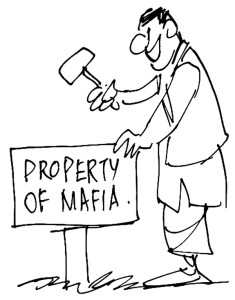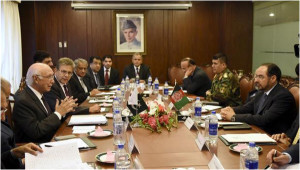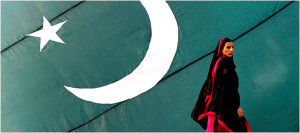
Children of a lesser god?
Sir,
Are they but the children of a lesser god? This question instantaneously pops in one’s mind with respect is what has come to define the status of the common man in Pakistan through the blatant occurrences and recurrences of the VIP culture that stains the very sociopolitical dynamics of the nation. The most recent and palpable manifestation of this reality is the unfortunate demise of the ten month old baby girl, Bisma, who failed to receive prompt medical treatment as her parents were barred from entering the emergency of the Civil Hospital Karachi for over an hour, where Bilawal Bhutto Zardari was present to inaugurate a trauma center. As if the situation was not morose enough to allude to the apathy of the leaders towards their subjects, what served as salt sprinkled on fresh wounds were the infamous remarks rendered by the senior minister of Sindh, Nisar Khuhro, who claimed that though he is aggrieved over the sad demise, but the “most precious life is that of Bilawal”.
This very statement aptly translates the elevated status of the leadership in Pakistan, the fact that how some lives come to be dearer than others, and how it is not deemed contrite that the common masses suffer in order to ensure the security of the lives of the not so common individuals. The images of the deceased baby and the manner her father was helplessly moving about to voice his concerns brought my mind the heart-wrenching image of the young Syrian refugee boy, Aylan Kurdi, clad in a red shirt and blue shorts, lying on the shores of one of the beaches of Turkey. Both Aylan and Bisma were the unfortunate victims of apathy. Apathy that consumes the cognition of leadership, impelling them to disown their subjects.
In Aylan’s case, the disownment is manifested by the Syrian refugee crisis, emanating primarily from the chaotic civil war that rages on in Syria. In Pakistan’s case, the sundering of the common masses is best revealed through the plethora of grave incidents relating to VIP culture, which is in fact a deeper malaise that has come to define the state. In 2006, a student of University of Karachi died of an appendix rupture after being stranded in a traffic jam for hours due to the presence of General Pervez Musharraf in the city. Though the event occurred in 2010, yet it seems only yesterday that we heard of a woman giving birth to a baby girl in an auto rickshaw since the police sealed all roads to allow President Zardari’s motorcade to pass through on his visit to Quetta. It was not long ago that a youth was shot dead by the guards of Abdul Qadir Gilani as he dared to overtake their motorcade. One wonders what is it that makes the lives of VIPs dearer than the common masses? What accounts for this preferential treatment?
An instant counter argument posed is that since Pakistan is enveloped in an existential security conundrum, it becomes imperative on the leaders to procure extensive security arrangements. This logic stresses on the redundant notion that it is not the individuals who are important, but as the posts they hold are quite cardinal, hence they need to procure such security arrangements. Even if one adheres to this hollow logic for a moment, the pressing question arises that should the security of the leadership come at the cost of the lives of the innocent civilians? Are their lives so cheap? Or are they so disposable that their absence does not matter? Do not these common individuals hold posts that make them the VIPs within their personal spheres of influence?
Psychologists have hailed the VIP culture as a form of psychological abuse. Eminent Psychological researches have proven that the VIP culture is quite prevalent in asymmetric societies, societies where the gap between the plebeians and the ruling elite is beyond tolerable limits, compels the subjects to be consumed with a sense of worthlessness brought about by a sense of alienation. Upon maturation, this sense of worthlessness compels many individuals to resort to unlawful practices to climb the social ladder. This partly accounts for the ever increasing crime rate in asymmetric societies and the story of Pakistan is no different.
According to news reports, today 34000 security personnel, which accounts for around 60% of the police force, have been deployed for the security of bureaucrats, politicians and top brass police officials. In parading around with their rather extravagant and extensive motorcades, they have stripped the common masses of their right to safety, which was something to be ensured by efficient police personnel adept at dealing with grinding situations. This fact manifests the hollow promises rendered by the leadership for the provision of security to their subjects.
The VIP culture is a major impediment for Pakistan in its yearning to evolve an effective and efficient democratic apparatus similar to Western standards. An exegesis of the Western politics reveals that though it took hundreds of years for them to evolve democracy in true letter and spirit, this is something they would not have managed to attain had they solidified the social classes, and denied pertinence to the concerns of the common masses. Contrary to what is quite commonplace in Pakistan, the rigid distinction between the haves and the have-nots is unobserved in the West. Something which is a norm in the West and would qualify as a breaking news in Pakistan is the prospect of a leader moving in the company of common masses to directly exchange graces with them or on the other hand doing chores by himself. How many of us know that just a day before he took the oath of the office of the President of the US, Barack Obama was painting the walls of a center reserved for homeless individuals. Of course not many of us know this, since this was not something that was thought of as pertinent enough to be flashed on television screens as breaking news. Did President Obama deem it as an insult to paint the walls by himself, an act that perhaps no Pakistani leader would even dream of engaging in since it would mean stooping well below his escalated pedestal?
It is indeed sad to see how the leadership has confused democracy and modernism with egotism. I have long maintained that for democracy to thrive in Pakistan, the narcissistic mindset of the leadership needs to be done away with. They need to realize that having been born in a lower strata of society does not make anyone less human. All attempts at evolving democracy or evolving as a nation for that matter would be futile unless we follow the true dictums of equality, equity and justice that blur boundaries between the haves and the have-nots, something not only followed by western democracies but also endorsed by our national heroes, be they Jinnah, Iqbal or Sir Syed Ahmed Khan.
Marria Qibtia Sikandar Nagra,
Islamabad.

Coalition of greedy
Sir,
Pakistan today suffers because the corrupt elite has ganged up together and is holding the state sovereignty hostage, eroding its economy and making a mockery of the laws in existence. This dishonesty started in 1948 with the fake allotments of evacuee properties, followed by Ayub’s policy of allotting state lands to salaried civil cum khaki bureaucracy, and now has assumed dangerous proportions where irregularity of multiple plot allotments has been regularised. Dishonesty and corruption are crimes, while incompetence is a deficiency. If elected civil government and military dictators at the helm were incompetent, than this should have reflected in their personal assets, which expanded astronomically.
When state enterprises alone are driven to bankruptcy and tax evasion goes unpunished, while billions of dollars are transferred to foreign safe havens, then this daylight robbery has been going on endlessly by design. The mere exposing of these crimes in the media serves no purpose, unless those named are given exemplary punishments, instead of conveniently giving them clearance through plea bargains, which only serves to promote corruption.
When the Musharraf government ignored the targeted murder of over 300 police officers for the sake of political exigencies, the stage was set for terrorists to challenge the authority of the state. The lives of over 50,000 citizens of Pakistan, including our men in uniform and over 150 children massacred by terrorists in APS Peshawar, could have been spared and over $50 billion that our economy has suffered could have been prevented. The NRO given to criminals involved in heinous crimes of murder, rape, kidnapping and robbing the state has reduced this country to a banana republic. State assets like PSM, PIA, CAA, OGDC, NICL, etc were reduced to white elephants by a government headed by a man addicted to corruption. State land and private property have been looted and charges of corruption are no longer a stigma, but the assumed status of qualification. How else can any government, including the incumbent, justify appointing individuals who have been accused of grave financial and social crimes? It is not the lack of qualified citizens with integrity that is the problem for these corrupt, but the fact that they would not serve the greed of those who wield power.
Ali Malik,
Lahore.

BB’s assassination still puzzling
Sir,
It was a tragic event in the history of Pakistan when Benazir Bhutto was killed on 27 December, 2007, in the garrison city of Rawalpindi. Nearly eight years have passed, but Bhutto’s assassination is still a question for Pakistan and its institutions. The question is who was behind the scene? However, many reports have been filed, arrests have been made, and certain group have claimed responsibility for the attack. Although Pakistani institutions alleged a fifteen-year-old child was the suicide bomber, a question can be raised here as to where the security agencies were when the crime happened?
BB was one of the most brilliant women in the history of the world. Her endowment and importance in world history has created a special place for her in the hearts of Pakistanis and left a vacuum in leadership; no Pakistani politician has been able to replicate that. She was born on June 21, 1953 in Karachi, daughter of renowned Pakistani politician Zulifqar Ali Bhutto. In her own life, she graduated with degrees in comparative government and philosophy, political science, and economics, having a brilliant academic career at Harvard and Oxford, she was elected as the president of the Oxford union and was the first woman prime minister of Pakistan.
After the assassination of former prime minister, her husband Asif Ali Zardari was elected the as president of Pakistan and also co-chairman of the Pakistan People’s Party, but he failed to hold the murderers of Benazir Bhutto responsible. Pakistani politicians blame one another: Sharif blames Musharraf and Musharraf blames terrorist groups and the Central Intelligence Agency (CIA)-declared Baitullah Mehsud responsible for Bhutto’s assassination. But US journalist Mark Siegel changed the scenario; he held General Musharraf responsible for the assassination of the former prime minister because she had informed him about the threat she faced from the former president.
A country that was acquired for the protection of the basic human rights of Muslims of India, is now full of lawlessness, where the death of a renowned political leader like Benazir became a question mark for the world, and at the domestic level, a blame game is going on between different political circles.
Kashif Manzoor,
Islamabad.

Afghan Peace Talks
Sir,
In early July, Pakistan hosted a first round of peace talks between the Afghan government and the Taliban in Murree. The Murree meeting followed a series of unofficial interactions between the Afghan government and the Taliban representatives in recent months in China, Norway and Qatar. Pakistan had high hopes that the Afghan peace process would be resumed soon, as this is very important for maintaining peace and stability in the country. The long border that Pakistan shares with Afghanistan and the number of Afghan refugees it hosts, Pakistan has great stakes in the Afghan peace talks.
For peace talks to take place, we have to first look into the most important matter that who are the main stakeholders, inside Afghanistan and foreign ones. The TTA, Prof Abdur Rab Rasool Sayyaf, the Haqqani Network and Dostum are the main stakeholders inside Afghanistan, while the United States, China and Pakistan are the foreign ones who have stakes in this region.
Now comes the question of negotiating or not negotiating and the consequences or the drawbacks for any of the options; in fact we have to calculate and see the pros and cons.
Now if we talk about not going for the negotiation process or talks, we have to go on with what we see is further suffering of civilians in a war with no end in sight. Not negotiating right now can make the insurgency stronger, making it more difficult to negotiate in future.
The peace process helps all stakeholders to recognise channels to hear the interests and concerns of all groups, even those that are extremists, and it enables all the stakeholders to be principled to address the root cause and the interests of each group.
The heart of Asia Conference has helped bring the international community on one page, not to fight militants but to bring them on the negotiating table. The Islamabad Declaration was passed at the Heart of Asia Conference, which referred to the participating countries’ agreement; 17 agreements were signed for a collective approach of countries to tackle the Afghan security issue.
Mehr Ispahani,
Peshawar.

Quaid’s doctrine
Sir,
Pakistan’s unfortunate fate has been treachery hatched by a few conspiring minds to remove from its archives the 11 August 1947 address by Quaid-e-Azam to the Constituent Assembly at the time. Even after 68 years, there is a vested group that advocates that democracy is not suited to the intellect of the people, knowing full well that the objective of the struggle by the Quaid and Iqbal for the creation of Pakistan was self-rule as a modern democratic welfare state. What these people forget is that it was the masses and not the British-trained paid civil cum khaki bureaucracy, nor the feudal beneficiaries of the Raj the in form of the Unionist Party, which supported the demand for a separate state.
His views about the paid bureaucracy were elaborated when he reminded them of “constitutional and legal implications” of the oath binding them to be faithful to the constitution and “that executive authority flows from the head of the Government of Pakistan”, further elaborating that “any command or orders that may come to you cannot come without the sanction of the Executive Head. That is the legal position”.
While referring to the role of the bureaucracy and political opportunism of the Unionist Party, created by Raj to run an occupied country, the Quaid wanted Pakistan to eradicate in his words the “curse” of corruption, bribery and black marketing, which we inherited in 1947. The Raj corrupted them with dole-outs of state land to buy their loyalties.
Instead of adhering to the Quaid’s vision, we are a country where corruption has been institutionalised, the state having distanced itself from its primary obligations of welfare, education and health, and instead become hostage to the insatiable greed for state lands and perks by paid and elected public officeholders, a remnant of the colonial Raj.
Politics of principles and ethics followed by politicians of caliber and integrity like Jinnah and Iqbal was reduced to politics of opportunism, where men without integrity abused power to become traders, serving themselves, indulging in massive tax evasion and making a mockery of ethics like conflict of interest.
Malik Tariq,
Lahore.

